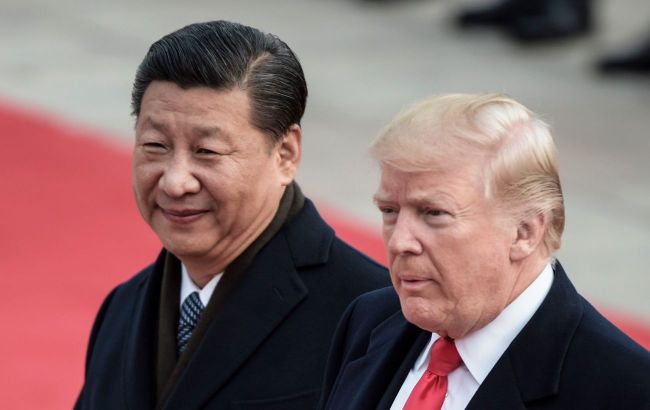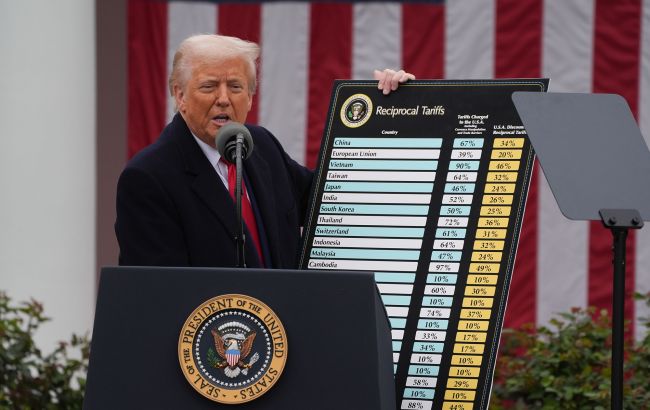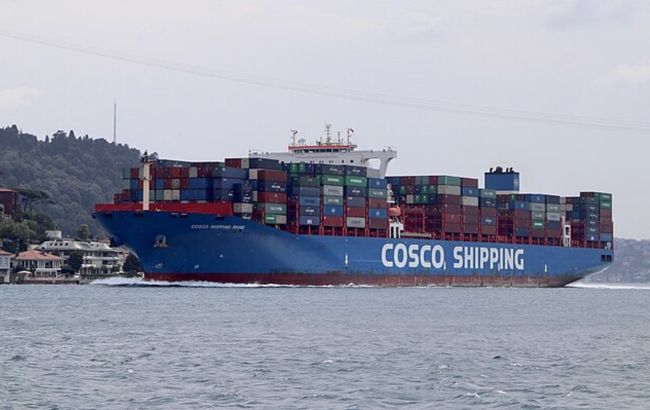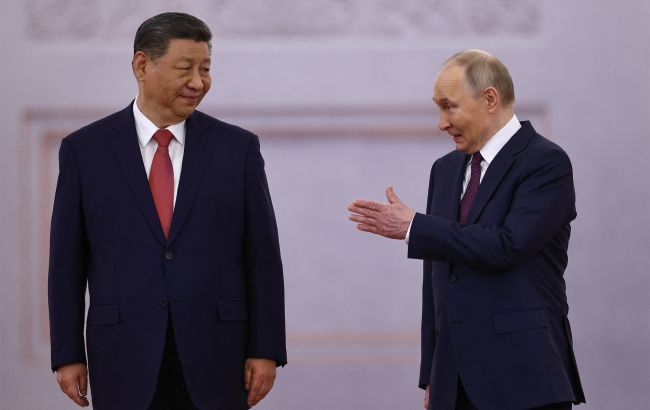Trump vs Xi showdown: What it could mean for Ukraine and rest of the world
 Photo: Xi Jinping and Donald Trump (collage by RBC-Ukraine)
Photo: Xi Jinping and Donald Trump (collage by RBC-Ukraine)
Later this week, US President Donald Trump and Chinese leader Xi Jinping will meet in South Korea. How could this meeting affect the world — and will it help bring an end to the Russia–Ukraine war? Read the analysis by RBC-Ukraine.
Key questions:
- Why do the US and China need this meeting?
- What's on the agenda?
- How likely is it that Trump and Xi will agree to put pressure on Russia?
Even before Donald Trump's inauguration, analysts predicted that China would become the main focus of his administration, pushing Russia to the background. Yet despite trade restrictions and bold statements, Trump has largely been distracted by other global crises — particularly the wars in Gaza and Ukraine.
As a result, his first meeting with Xi Jinping will take place only in the tenth month of his presidency — at the sidelines of the Asia-Pacific Economic Cooperation (APEC) summit in Gyeongju — following the kind of diplomatic maneuvering typical of Trump. The two nations have a wide range of issues to discuss, from trade to international conflicts.
Trump has already said that the Russia–Ukraine war will be one of the topics during his talks with the Chinese leader. Among other things, he plans to discuss ways to pressure Moscow.
"I'd like China to help us out with Russia," Trump said on October 24.
That's not surprising. As RBC-Ukraine has previously reported, China has effectively served as Russia's rear base in its war against Ukraine. According to Ukraine's Foreign Intelligence Service, by early 2025, 80% of critical electronics used in Russian drones were of Chinese origin. China also buys Russian oil and gas at discounted prices, indirectly financing the Kremlin’s aggression.
Still, Beijing's support has its limits. For China, Russia must remain under Putin's control — that way, Moscow can continue serving as a source of cheap raw materials. At the same time, Beijing has no interest in seeing a pro-Western regime emerge on its border.
However, a Russian victory would make Putin's regime even more aggressive and reckless — not only toward Europe but toward China itself.
The meeting in South Korea, scheduled for October 30, follows the cancellation of the planned Trump–Putin summit in Budapest. On October 22, Trump unexpectedly canceled the talks with the Russian dictator and imposed sanctions on two of Russia’s largest oil companies.
For now, it remains unclear whether these sanctions are a one-time measure or the beginning of a broader pressure campaign. According to CNN, one of the triggers behind Trump’s sudden action was a Russian drone strike on a kindergarten in Kharkiv.
What's clear is that for both leaders, the issue of Ukraine and Russia is only one among many. The key question is how exactly it will be used during their negotiations.
Trade blows
The Trump–Xi meeting has been postponed several times due to the trade war the US unleashed against much of the world. While many countries have since sought to reconcile with Washington, China continues to resist. Several rounds of negotiations between the two powers resulted in a preliminary draft agreement — but it has yet to be finalized.
So, even though the APEC summit had been announced long in advance, there was lingering uncertainty about whether Trump and Xi Jinping would actually attend. The White House confirmed the meeting only last week.
The past month, meanwhile, has been full of significant signals from both sides.
On October 9, China announced a sweeping expansion of export controls on rare earth elements and related technologies. Beijing controls roughly 90% of global rare earth supplies — materials critical for many US high-tech industries.
Under the new rules, any product made outside China that uses Chinese technologies or materials (if their share exceeds 0.1%) will now require an export license.

Donald Trump during the introduction of trade tariffs, including those targeting China (Photo: Getty Images)
At the same time, China completely halted its purchases of American soybeans — for the first time since 2018. This is a serious blow to farmers in Iowa and Illinois, who have lost their main export market. Both states are key to Trump’s prospects in next year’s congressional elections. In response, China began buying soybeans from Brazil and Argentina instead.
The US, in turn, continues to tighten export controls on semiconductor supplies to China. In September, Washington added 23 Chinese companies linked to chip production to its blacklist. The Trump administration also extended sanctions to include subsidiaries of already blacklisted entities.
Trump has additionally threatened to impose an extra 100% tariff on Chinese goods starting November 1 if Beijing doesn’t lift its restrictions. The US trade deficit with China reached about $295 billion in 2024, and the president is eager to reduce that imbalance. He has also said he wants to secure preferential treatment for American companies operating in the Chinese market.
Why now
This time, several factors are pushing both sides toward a meeting. According to Dean Karalekas, a security expert on the Asia-Pacific region and a research fellow at the Center of Austronesian Studies at the University of Central Lancashire, Trump is shrewd enough to recognize that the timing works in his favor. Beijing, he says, is currently facing deep internal instability.
"There have been wild rumors that Xi had suffered a stroke just a couple of weeks ago; China's new rare-earth export control regime is backfiring disastrously; and the takeaway from the Fourth Plenum, which was just held, is showing some of the cracks forming in the system, or at least in how the system operates under Xi," Karalekas said.
Out of the 205 full members of the Chinese Communist Party's Central Committee appointed in 2022, only 168 remained by last week's plenum — possibly one of the largest purges of senior officials in the CCP's 76-year history. The military leadership has also been thinned out. On October 17, China's Ministry of Defense announced the expulsion of nine top generals from the party, including He Weidong, the vice chairman of the Central Military Commission — the country's top military authority.
According to Karalekas, the cost of the trade war with the US has become too high for China. With the real estate market collapsing, overproduction of consumer goods is now the only way Beijing can maintain employment levels.
"It means that they cannot afford to alienate the only market on Earth big enough to keep buying - America. So, Trump is going in from a position of strength, and I hope he is aware of it, and that he chooses to capitalize on it," he expert said.
Pragmatic talks
Judging by statements from both sides, the minimum goal is to roll back some of the recent unfriendly actions against each other.
“We're going to make a deal on rare earths — at least," Trump said.
He also expressed expectations of agreements on soybean purchases and nuclear arms limitations.
Meanwhile, China's Commerce Minister Wang Wentao said that dialogue and cooperation are the only correct choice for China and the US, emphasizing that Beijing opposes any decoupling of the two economies.
Given the background of the meeting, there's a fairly strong chance of reaching at least partial agreements. US Trade Representative Jamieson Greer said that trade talks between the two countries are approaching their "final details." On October 25–26, he and US Treasury Secretary Scott Bessent met with senior Chinese officials, agreeing on a framework agenda for Trump and Xi's upcoming discussion.

A container ship sailing from China to the EU (Photo: Getty Images)
According to Karalekas, we can expect several joint statements or working groups to be formed on tariffs, market access, and supply chains.
"It will be interesting to see what statement Trump makes on the Taiwan issue coming out of the meeting. But what both sides want from this meeting is the illusion of stability in the relationship, which means we’re unlikely to see any real, impactful changes," Karalekas emphasized.
He added that China will likely make all kinds of promises — on trade imbalances, on cracking down on fentanyl precursors (a synthetic drug causing mass deaths in the US), and on pressuring Russia over Ukraine — to get what it wants from Trump. Among Beijing's desired concessions: the lifting of tariffs and certain statements from Washington regarding its commitments to Taiwan.
However, Karalekas said, based on China's past behavior, it's highly unlikely Beijing will actually follow through on any of these promises.
"Even if the US and China reach some kind of framework deal, it won't be long-lasting due to the deep mistrust and strategic competition between the two," agreed Natalia Butyrska, a master of foreign policy and East Asia expert, speaking to RBC-Ukraine.
There are simply too many structural contradictions between Washington and Beijing — from the race for technological dominance in artificial intelligence to the contest for influence across Southeast Asia, Africa, and Latin America.
From Kyiv to Taipei
Given all this, Beijing is unlikely to take any sharp turns on its Russia policy. Should Trump and Xi reach any agreements, China will have to find a delicate balance — limiting its support for Moscow's war effort while still preventing Russia from political or economic collapse.
In this context, China may also try to link any pressure on Russia to the Taiwan issue. Beijing considers the island part of its territory, though in practice, Taiwan operates as an independent country. This situation dates back to 1949, when the Chinese Communist Party won the civil war on the mainland and its rivals — the Kuomintang — retreated to Taiwan. China regularly conducts military exercises near the island but has so far avoided any direct military attempt to seize it.
Both cases — Ukraine and Taiwan — are primarily political for both sides and do not significantly impact their economies.
According to Natalia Butyrska, China has long sought for the US to change its official wording from "does not support Taiwan's independence" to "opposes Taiwan's independence." This issue has already come up in previous rounds of US-China discussions.
Meanwhile, Trump has publicly sought to downplay fears of a potential Chinese invasion of the island.
"That doesn't mean it's not the apple of his (Xi Jinping's - ed.) eye, because probably it is, but I don't see anything happening,” Trump said on October 20.
The US President hinted that America's military power acts as a deterrent, but stopped short of promising to defend the island in case of an attack.
Still, Taipei is nervous about what could come out of the Trump–Xi talks. Four senior Taiwanese officials told Reuters they fear Trump might trade away their interests in exchange for Chinese trade concessions.
"Everyone in Taiwan is concerned, and it's the government's responsibility to make sure that doesn't happen," one Taiwanese official told Reuters.
In exchange for concessions on Russia and Ukraine, China may also seek preferential treatment in its relations with Kyiv.
"For example, there's information that China wants to take part in Ukraine's postwar reconstruction and to have its troops stationed along the line of contact between Ukrainian and Russian forces. That would allow Beijing to enter the European continent as a security guarantor and effectively mark the outer borders of its influence," said Oleksandr Leonov, executive director of the Penta Center for Applied Political Studies, in a comment to RBC-Ukraine.

Xi Jinping and Vladimir Putin (Photo: Getty Images)
On the other hand, regarding Ukraine, the US has at its disposal a tool of secondary trade tariffs — a measure still under discussion as a key lever to pressure the Kremlin. Secondary tariffs were already used during Trump's previous term: he imposed them on India without hesitation but limited himself to threats against China, understanding the potential blow to the US economy. This is also one reason behind delays in passing the Graham–Blumenthal bill, which would authorize up to 500% tariffs on those buying Russian energy resources.
As RBC-Ukraine has reported, there's a growing consensus in Washington and Brussels that secondary tariffs are the most realistic way to force Beijing to distance itself from Moscow or at least scale back its exports of goods critical to Russia’s defense industry. However, the effectiveness of that strategy depends entirely on how far the US is willing to go. So far, Trump continues to take a halfway approach in his relations with Moscow.
Risk of escalation and what comes next
Given Trump's negotiation style, a complete collapse of the talks cannot be ruled out. Instead of an agreement, the US and China could end up escalating their confrontation even further — particularly in the trade arena.
November 1 is the deadline Trump set for imposing an additional 100% tariff on Chinese goods in response to Beijing's rare earth export restrictions. Added to the existing 30% tariffs, this could effectively freeze a significant portion of trade between the world's two largest economies.
Amid its own economic troubles caused by the trade war, Beijing may conclude that it's time to bring the Russia–Ukraine conflict to an end. One reason for that would be its efforts to strengthen ties with the European Union, China's second most important export market.
"If no deal is reached, China might engage Europe more actively — its second-largest market — offering to pressure Russia in exchange for trade preferences with the EU, participation in Ukraine's reconstruction, and so on,” Leonov explained.
***
The situation should become clearer later this week. For now, Ukraine and its European allies see an advantage in the difficulties China faces due to new US sanctions on Russian oil companies. The fact that Trump imposed these sanctions right before his meeting with Xi Jinping is a major turning point, Butyrska noted.
"Whether or not China chooses to comply with those sanctions, it will now have to be cautious. Beijing may deny supporting Russia rhetorically, but its companies could come under serious fire from the US," Butyrska emphasized.
According to Bloomberg, sanctions against Rosneft and Lukoil have already caused concern within China’s oil industry. Butyrska believes this will likely become the most tangible and effective way to reduce China's support for Russia.
On October 30, the world will be watching closely as Trump and Xi meet for the first time in a new geopolitical reality — one where the old rules no longer work, and the new ones have yet to be written.
Sources: South China Morning Post, Reuters, BBC, CNN, Bloomberg, Anadolu, Al Jazeera, Focus Taiwan, and commentary from Dean Karalekas, Natalia Butyrska, and Oleksandr Leonov.

